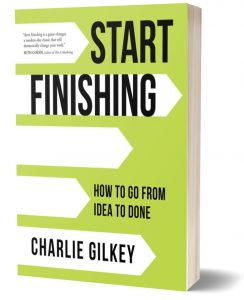AVOIDING YOUR BEST WORK LEADS TO CREATIVE CONSTIPATION
 The following is a modified excerpt from Start Finishing: How to Go from Idea to Done.
The following is a modified excerpt from Start Finishing: How to Go from Idea to Done.
***
There’s a big difference between what your best work and all the other work you do. Doing your best work is fulfilling while you’re doing it and also creates a bridges the gap between the life you live today and the life your soul yearns to be in. And your best work isn’t just about work you get paid for — it could be playing in your hobby band, raising your kids, being the church secretary, or community volunteer projects.
Your best work is always going to be challenging because it’s the work that matters to you. And because it matters to you, you’re going to be thrashing — that is flailing, having mini identity crises, “researching”, and all the other kinds of meta-work that doesn’t actually push the work forward — along the way. Best work is starting to look suspiciously like hard work, and our natural reaction is to avoid doing hard work and to instead find something easier to do.
When it comes to your best work, not doing it comes with two major costs: (1) you won’t be able to thrive, and (2) you’ll be stricken with creative constipation. Since I’ve already discussed the link between thriving and your best work, let’s talk about creative constipation, or the pain of not doing your best work.
Creative constipation is exactly what it sounds like. We take in ideas and inspiration that get converted into aspirations, goals, and projects, and at a certain point, if we’re not pushing them out in the form of finished projects, they start to back up on us.
And like physical constipation, at a certain point, we get toxic. We don’t want to take in any more ideas. We don’t want to do any more projects. We don’t want to set any more goals or plans. We’re full and fed up.
That inner toxicity becomes the broth that flavors all our stories about ourselves and the world; our head trash gets more pronounced and intense, and what we see in the world goes from bright to dark. Creative constipation leads to behaviors in which we lash out at the world—and sometimes even more intensely at ourselves. We become resentful of others—even people we love—who are doing their best work.
Our ability to feel positive emotional peaks is diminished at the same time that our ability to feel negative emotional troughs is amplified. You’ve no doubt encountered the tortured, depressed soul who’s creatively constipated—and you may have been there yourself.
There’s a reason that nearly every spiritual tradition links creativity and destruction: the same energy that fuels creation also fuels destruction. The Jewish, Christian, and Muslim God creates and destroys; “beating swords into plowshares” works equally in reverse. The Hindu god Shiva is seen as
a destroyer who makes way for creativity. Creativity and destruction are seen as a continual loop in the Taoist concept of yin and yang.
Spiritual insights such as these also show up in our everyday lives. Think about how often you’ve engaged in retail therapy—and thus destroyed your time and resources—because you’re unsatisfied about something in your life. Think about how often you’ve indulged in emotional eating because you’re not creating the change you want to see in your life. Think about how many people blow up their lives in a midlife crisis because the career and life they’ve made haven’t satisfied their deep needs.
Now think about the people you know or have read about who are doing their best work. Notice how they’re healthier, happier, (usually) more financially comfortable, and in good relationships with others? Doing their best work creates meaning for them at the same time that it cocreates who they want to be in the world. And these folks know that doing their work in the world is the wheel of change, meaning, and growth, more so than merely being stuck in their heads.
So at both deep and practical levels, we can choose to channel our energy to do our best work and thrive, or we can choose to leave it unharnessed to gradually destroy ourselves, our relationships, our resources, and the world around us.
Better to do the hard work of creation than the hard work of repairing the destruction we’ve wrought.
 Charlie Gilkey is an author, entrepreneur, philosopher, Army veteran, and renowned productivity expert. Founder of Productive Flourishing, Gilkey helps professional creatives, leaders, and changemakers take meaningful action on work that matters. His new book is Start Finishing: How to Go from Idea to Done. Learn more at productiveflourishing.com.
Charlie Gilkey is an author, entrepreneur, philosopher, Army veteran, and renowned productivity expert. Founder of Productive Flourishing, Gilkey helps professional creatives, leaders, and changemakers take meaningful action on work that matters. His new book is Start Finishing: How to Go from Idea to Done. Learn more at productiveflourishing.com.









